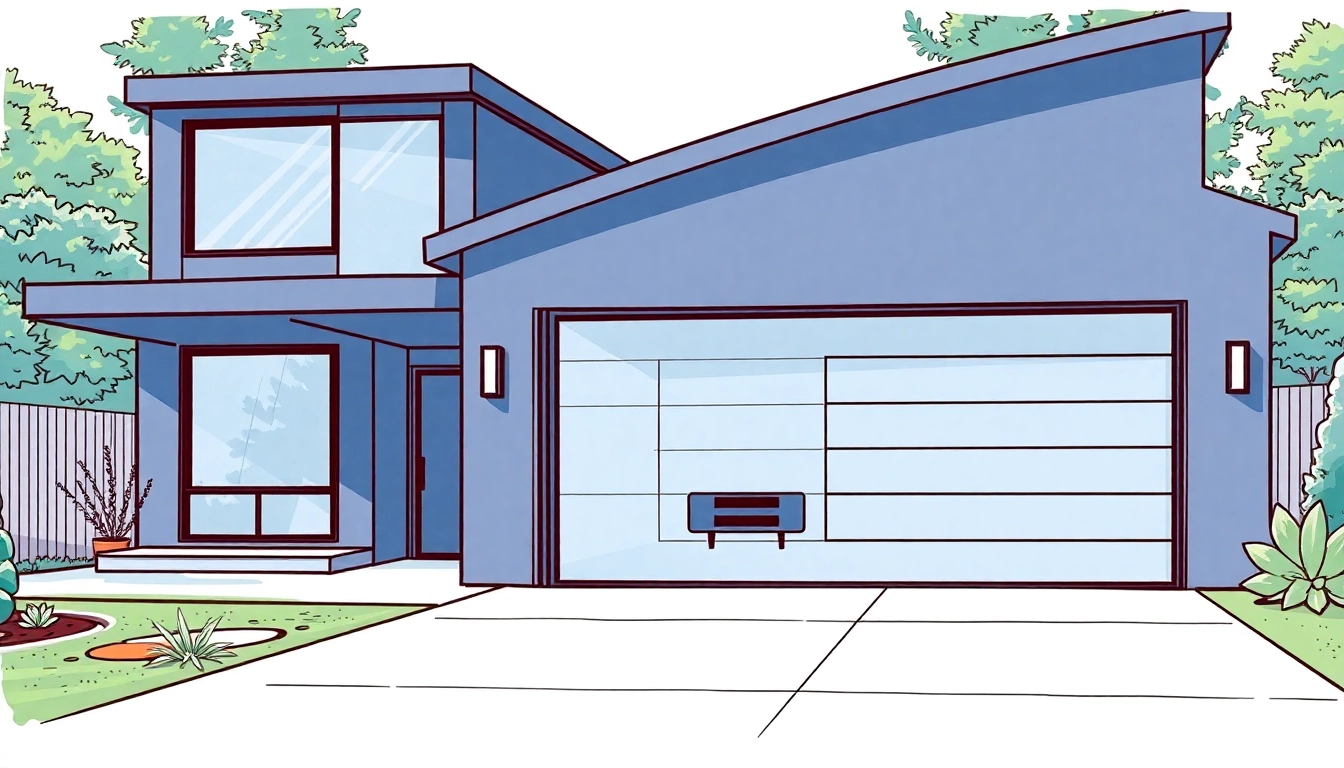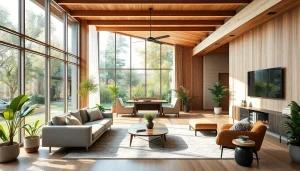Understanding Custom Garages
Custom garages are an increasingly popular choice for homeowners looking to enhance their property, serve specific functional needs, or simply express personal style. These tailored structures go beyond the typical pre-fabricated garages, allowing owners to create a space that fits perfectly with their lifestyle and belongings. By embracing the flexibility of custom garages, homeowners can address various needs—from vehicle storage to hobby spaces and more.
What is a Custom Garage?
A custom garage is a garage that has been specifically designed and built to meet the unique needs and preferences of the owner. Unlike standard models, which often come in predetermined sizes and styles, custom garages may include features such as additional storage, configured workspaces, or even guest accommodations. The design process can involve collaboration between the homeowner and builders to ensure that the garage integrates seamlessly with the existing property and fulfills all desired functions.
Benefits of Custom Garages
Investing in a custom garage offers numerous advantages:
- Personalization: Every aspect of a custom garage can be tailored to the owner’s specifications, from size to materials, ensuring that it reflects personal style.
- Increased Property Value: Custom garages can significantly enhance a home’s value, making it more appealing to potential buyers.
- Improved Functionality: Homeowners can design storage solutions that work best for their needs, whether it’s extra shelving, built-in cabinets, or specialized work areas.
- Unique Aesthetics: Custom garages can enhance the overall curb appeal of a home with thoughtful architectural designs that complement the existing structure.
Types of Custom Garages
There are several types of custom garages that homeowners can consider based on their specific needs:
- Detached Garages: Often built away from the main residence, these garages provide ample space and can serve multiple purposes beyond vehicle storage, such as workshops or recreational spaces.
- Attached Garages: These structures are directly connected to the home, offering convenience for accessing belongings and vehicles.
- Customizable Carports: While primarily for vehicle protection, carports can be designed with walls, storage, and additional roofs for aesthetics and functionality.
- Versatile Workshop Garages: Ideal for hobbyists and DIY enthusiasts, these garages incorporate necessary equipment, workstations, and organization systems.
Designing Your Custom Garage
The design of a custom garage is a critical factor that influences its functionality and aesthetics. Homeowners must consider various elements, such as size, layout, materials, and style, to create a garage that meets their specific requirements.
Key Design Considerations
When designing a custom garage, consider the following:
- Purpose: Determine the garage’s primary function—whether it’s for parking vehicles, storage, or as a multipurpose workshop.
- Space Planning: The garage should be effectively organized to utilize all available space. This includes planning for vehicle sizes, storage areas, and walkable pathways.
- Accessibility: Ensure that drivers can easily access the garage without obstacles and that it allows for smooth ingress and egress.
- Future Needs: It may be beneficial to design the garage with potential future uses in mind. For instance, if you plan to expand your family or invest in additional vehicles, build with those possibilities incorporated.
Choosing Materials and Finishes
Material selection plays a crucial role in the durability, maintenance, and overall appearance of the garage. Common materials include:
- Steel: Known for durability and security, steel is a popular choice for custom garages, especially for those in regions prone to harsh weather.
- Wood: Offers a classic aesthetic, allowing for extensive customization in design and finish. However, it may require more maintenance over time compared to other materials.
- Vinyl and Fiber Cement: These materials are low-maintenance options that can emulate the appearance of wood without the drawbacks.
Also, consider the finishes, ranging from paint colors to roofing styles. Think about the overall look of your home and choose finishes that complement it cohesively.
Balancing Style and Functionality
The perfect custom garage combines aesthetic appeal with practical functionality. When designing, focus on:
- Layout Efficiency: An efficient layout means maximized space usage and ease of access to stored items.
- Visual Harmony: The garage should harmonize with the overall property style, whether traditional, modern, or industrial.
- Natural Lighting: Incorporating windows or skylights not only adds aesthetic value but also enhances work efficiency by providing natural light during the day.
Cost Factors in Building Custom Garages
The cost of custom garages varies significantly based on several factors, including size, materials, design complexity, and location. Being aware of these factors can help homeowners with budgeting and financial planning.
Understanding Pricing Structures
Custom garage pricing often includes a variety of components:
- Materials: The choice of materials will significantly impact the overall cost. High-quality materials may come at a premium, but they also ensure longevity.
- Labor Costs: Hiring skilled labor, especially for custom work, can increase costs. Rates may vary based on the type of structure and local labor market.
- Permits and Inspections: Local building regulations may require permits for construction, which can add to the total expense.
Budgeting for Your Custom Garage
Creating a realistic budget involves considering not only the construction costs but also future expenditures:
- Initial Investment: Establish a budget covering all aspects of building your garage from materials to finishing touches.
- Ongoing Maintenance: Factor in long-term care costs for upkeep, including cleaning, repairs, and upgrades.
- Future Enhancements: Consider setting aside funds for potential expansions or improvements to the garage over time.
Financing Options Available
For homeowners considering building a custom garage, there are several financing options to explore:
- Home Equity Loans: Using the equity in your home can provide necessary funds for building.
- Construction Loans: These specialized loans cater to individuals seeking to finance construction projects specifically.
- Personal Loans: A personal loan can be another means to secure funding, although usually at higher interest rates than secured loans.
Building Process of Custom Garages
The construction of a custom garage involves distinct phases that must be executed meticulously to achieve the desired outcome. Knowing what to expect at each stage can streamline the process.
Steps in the Construction Process
The process typically includes the following steps:
- Consultation and Planning: Engage with builders to discuss needs and preferences while assessing site feasibility.
- Design Development: Create detailed design plans that include layouts, dimensions, and material selection.
- Permitting: Obtain necessary permits to ensure compliance with local building codes.
- Construction: Begin construction following a structured timeline and project management protocols.
- Final Inspection: Conduct a thorough inspection after completion to ensure everything meets standards and requirements.
Choosing the Right Builder
Selecting a reputable builder is essential for a successful project. Consider the following criteria:
- Experience: Look for builders with a proven track record in constructing custom garages similar to your desired outcome.
- References and Reviews: Seek out references and online reviews to gauge the builder’s reputation and customer satisfaction.
- Detailed Quotes: Obtain detailed estimates from multiple builders to compare costs and project scopes.
Timeline for Completion
The timeline for building a custom garage can vary based on several factors, such as:
- Size and Complexity: Larger and more intricate designs typically take longer to complete.
- Weather Conditions: Adverse weather can delay construction schedules.
- Supply Availability: Availability of materials can impact timelines, particularly for custom orders.
Maintaining Your Custom Garage
Regular maintenance is vital to ensure the longevity and functionality of your custom garage. By implementing a strategic maintenance plan, homeowners can protect their investment.
Routine Maintenance Tips
Here are some routine maintenance tips to keep your custom garage in excellent condition:
- Regular Cleaning: Schedule regular cleaning sessions to remove dirt, debris, and potential hazards.
- Check Security Features: Regularly inspect locks, alarms, and other security features to ensure proper functionality.
- Inspect the Structure: Periodically check for signs of wear and tear, such as cracks, leaks, or rust, and address issues promptly.
Improving Longevity
To extend the lifespan of your garage, consider these additional measures:
- Weatherproofing: Invest in quality weatherproofing materials that can shield the garage against potential environmental damage.
- Proper Ventilation: Ensure adequate ventilation to prevent moisture buildup, which can lead to mold and structural damage.
- Insulation: Insulating the garage can help regulate temperature and reduce wear on shared systems within the home.
Innovative Features for Your Garage
Consider incorporating innovative features to enhance utility and comfort:
- Smart Technology: Utilize smart home integrations such as automatic garage door openers, cameras, and sensors for enhanced security and convenience.
- Custom Storage Solutions: Implement built-in cabinetry, shelving, and overhead storage to maximize available space efficiently.
- Workshop Areas: Dedicate specific spots for work benches and tools, ensuring you have a functional space for hobbies or repairs.


